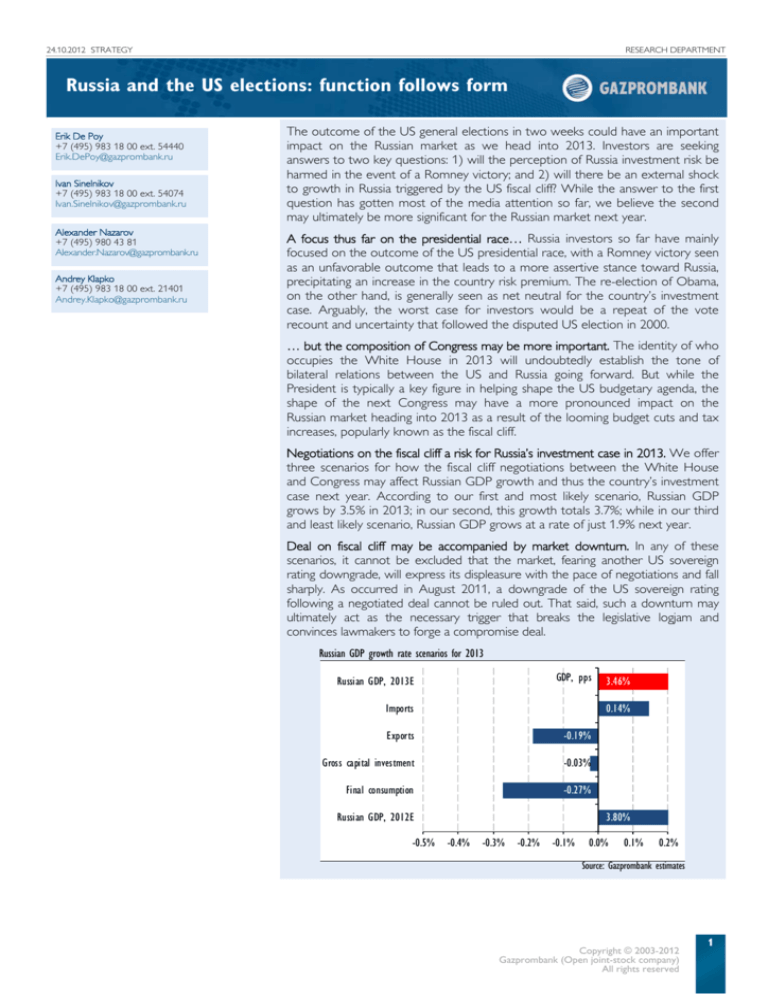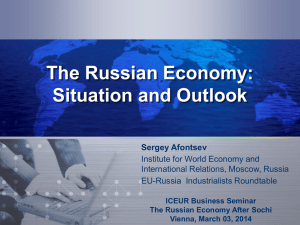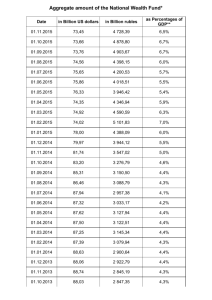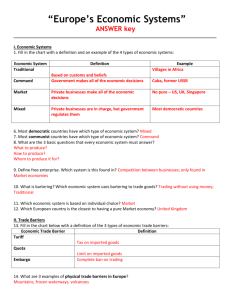
24.10.2012 STRATEGY
RESEARCH DEPARTMENT
Russia and the US elections: function follows form
;
Erik De Poy
+7 (495) 983 18 00 ext. 54440
Erik.DePoy@gazprombank.ru
Ivan Sinelnikov
+7 (495) 983 18 00 ext. 54074
Ivan.Sinelnikov@gazprombank.ru
Alexander Nazarov
+7 (495) 980 43 81
Alexander.Nazarov@gazprombank.ru
Andrey Klapko
+7 (495) 983 18 00 ext. 21401
Andrey.Klapko@gazprombank.ru
The outcome of the US general elections in two weeks could have an important
impact on the Russian market as we head into 2013. Investors are seeking
answers to two key questions: 1) will the perception of Russia investment risk be
harmed in the event of a Romney victory; and 2) will there be an external shock
to growth in Russia triggered by the US fiscal cliff? While the answer to the first
question has gotten most of the media attention so far, we believe the second
may ultimately be more significant for the Russian market next year.
A focus thus far on the presidential race… Russia investors so far have mainly
focused on the outcome of the US presidential race, with a Romney victory seen
as an unfavorable outcome that leads to a more assertive stance toward Russia,
precipitating an increase in the country risk premium. The re-election of Obama,
on the other hand, is generally seen as net neutral for the country’s investment
case. Arguably, the worst case for investors would be a repeat of the vote
recount and uncertainty that followed the disputed US election in 2000.
… but the composition of Congress may be more important. The identity of who
occupies the White House in 2013 will undoubtedly establish the tone of
bilateral relations between the US and Russia going forward. But while the
President is typically a key figure in helping shape the US budgetary agenda, the
shape of the next Congress may have a more pronounced impact on the
Russian market heading into 2013 as a result of the looming budget cuts and tax
increases, popularly known as the fiscal cliff.
Negotiations on the fiscal cliff a risk for Russia’s investment case in 2013. We offer
three scenarios for how the fiscal cliff negotiations between the White House
and Congress may affect Russian GDP growth and thus the country’s investment
case next year. According to our first and most likely scenario, Russian GDP
grows by 3.5% in 2013; in our second, this growth totals 3.7%; while in our third
and least likely scenario, Russian GDP grows at a rate of just 1.9% next year.
Deal on fiscal cliff may be accompanied by market downturn. In any of these
scenarios, it cannot be excluded that the market, fearing another US sovereign
rating downgrade, will express its displeasure with the pace of negotiations and fall
sharply. As occurred in August 2011, a downgrade of the US sovereign rating
following a negotiated deal cannot be ruled out. That said, such a downturn may
ultimately act as the necessary trigger that breaks the legislative logjam and
convinces lawmakers to forge a compromise deal.
Russian GDP growth rate scenarios for 2013
GDP, pps
Russian GDP, 2013E
Imports
0.14%
Exports
-0.19%
Gross capital investment
-0.03%
Final consumption
-0.27%
Russian GDP, 2012E
-0.5%
3.46%
3.80%
-0.4%
-0.3%
-0.2%
-0.1%
0.0%
0.1%
0.2%
Source: Gazprombank estimates
Copyright © 2003-2012
Gazprombank (Open joint-stock company)
All rights reserved
1
24/10/2012
Research Department
+7 (495) 287 6318
What does the US presidential election imply for Russia?
Early voting for the 2012 US presidential election has begun, and First Lady Michelle
Obama has cast her vote. Thus far, most Russia investors have focused on the
outcome of the presidential race, which will undoubtedly be important for bilateral
relations in the coming years. With the third and final debate now over, the odds of
Obama being re-elected as measured by prediction market Intrade.com currently stand
at around 54%, with Romney given about a 46% chance of victory. The latest Gallup
daily tracking poll of likely voters, however, suggests that Romney has a seven-point
lead over Obama. The accuracy of these polls aside, it seems clear that uncertainty
regarding the outcome is likely to linger right up until election day on November 6.
In terms of policy stance, Governor Mitt Romney has attempted to distance himself
from President Barack Obama in the foreign policy realm by being the most
outspoken and assertive regarding US policy toward Russia. Among other things, he
has publicly referred to Russia as the “number one geopolitical foe” of the US, and
his campaign website indicates his pledge to “reset the reset” and “discourage
aggressive behavior on the part of Russia”, for example by reviewing
implementation of the START arms control treaty.
The cynical view of the US political process is that Romney’s statements are driven
more by a desire to appease elements within his party and electorate while
differentiating himself from Obama than any real conviction to revive Cold War
tensions. According to this view, Romney will likely temper his public statements
after entering office and a period of accommodation will ensue. Russia was not a
major topic of discussion during the third presidential debate devoted to foreign
policy, although Romney did say the following: “Russia does continue to battle us in
the UN time and time again. I have clear eyes on this. I’m not going to wear rosecolored glasses when it comes to Russia, or Mr. Putin. And I'm certainly not going
to say to him, 'I'll give you more flexibility after the election'”.
An argument can be made that the market would be satisfied with either candidate as
long as the election does not repeat the disputed vote recount and Supreme Court
decision following the 2000 election between George W. Bush and Al Gore. Taken at
face value, however, a Romney administration would potentially be most concerning
for Russia investors, and a knee-jerk negative reaction in the Russian equity market
(albeit temporary) cannot be excluded in the days immediately following his election.
What about the Congressional elections?
While the outcome of the presidential election will undoubtedly be important for the
tone of US-Russia bilateral relations going forward, we think the form of the next
Congress may ultimately be more important for how it functions. After all, it is the
Congress that shapes fiscal policy and will have to approve any deal to address the
grave fiscal issues facing the US government in the form of the so-called ‘fiscal cliff’.
What is the fiscal cliff?
Among other items, the fiscal cliff comprises more than $400 bln in tax increases
and $200 bln in spending cuts in fiscal years 2012-13 stemming from last year’s
compromise deal reached by the US budgetary supercommittee. In total this equals
roughly 4% of nominal US GDP and, on an annualized basis (i.e. including the
effects in calendar years 2012-13), the permanent fiscal tightening would amount to
more than $800 bln (5.1% of GDP).
The US Congressional Budget Office (CBO) believes that in the worst case
involving the full impact of the fiscal cliff, a failure to reach a deal could potentially
reduce the US GDP growth rate by up to 3.9 pp in 2013, with the economy
contracting 1.3% in the first half and expanding 2.3% in the second. The rating
agency Fitch believes this outcome could cut the emerging markets growth rate in
half. Russia would hardly be immune to such a global downturn, particularly if oil
demand destruction were to ensue, as occurred in 2008-09.
2
Russia and the US elections: function follows form
24/10/2012
Research Department
+7 (495) 287 6318
Impact globally
Estimates vary regarding the impact that falling off the fiscal cliff would have on the
US and global economies. At the APEC summit in Vladivostok on September 9,
IMF Managing Director Christine Lagarde said that the fiscal cliff was one of “three
key risks” for the global economy in 2013, the other two being the Eurozone crisis
and medium-term public financing. The IMF forecasts 2.1% GDP growth in the US
in 2013 (and 3.6% for the world), but these figures are subject to downward
revision should US fiscal policy be tightened.
According to Fitch, the fiscal cliff represents the most significant near-term threat to
world economic recovery. The rating agency estimates that the fiscal cliff would
reduce US GDP growth in 2013 by 2.0 pps, from 2.3% to just 0.3%. In terms of
major consequences for the global economy, as domestic demand fell US imports
would drop faster than exports. The resulting improving trade balance would need
to be matched by deterioration in trading partners' balances, causing growth to
slow. Fitch estimates that such a shock would slash the world GDP growth rate in
half, from their current estimate of 2.6% to just 1.3%.
We believe the knock-on effects globally could trigger “risk-off” sentiment and lead
to dollar appreciation, which in turn would weigh on oil and other export
commodity prices – a direct risk to the Russian economy and financial markets.
Impact on Russia
Although the US accounts for just 3% of Russia’s direct foreign trade, the knock-on
effects globally from an economic shock totaling 5% of US GDP could be severe.
Finished goods exporters like China and Japan would be the first group of countries
to be affected, likely in 1H13, followed by commodity exporters like Russia and
Australia in 2H13 and into 2014. Although baseline GDP growth would resume, it
would likely do so at lower trend rates.
The IMF believes that the CIS region would not be immune to the impact from a
global downturn through potentially sharp falls in commodity prices. Further
destabilization in the Eurozone would also be felt in Russia since Europe is now its
largest trading partner outside the CIS. For Russia, the IMF sees 3.75% real GDP
growth in 2013, led by domestic demand and supported by expansionary fiscal
policy and sustainable credit growth. This compares with our slightly more
optimistic base-line expectations (assuming no fiscal cliff) of 3.8-4.0% GDP growth
and decelerating credit growth.
Impact on equity markets
Historically, the impact from US elections on the Russian market has varied
considerably, with no clear trend seen in RTS index performance in November of
election years. Moreover, the infrequency of elections since 1996 (the first data
point we have to work with, as the RTS Index only began to be calculated in
September 1995) would make any potential correlation statistically insignificant.
RTS Index performance during US election months: no clear trend
Year*
Change, %
1996
5.2
1998
15.9
2000
-27.0
2002
1.0
2004
-8.2
2006
8.2
2008
-21.3
2010
2.1
*bold indicates general election year
Source: RTS-MICEX, Gazprombank estimates
The situation is similar with regard to US elections and the US stock market. Since 1900,
the average return for the Dow Jones Industrial Average when a Democrat has occupied
3
Russia and the US elections: function follows form
24/10/2012
Research Department
+7 (495) 287 6318
the White House has been about 8.5%, compared with around 6.0% for Republican
administrations. After accounting for market volatility, the figures are essentially even. It is
also largely inconclusive whether a divided government is better or worse for the
markets: although the Dow has tended to perform a bit better when one party controls
both the White House and Congress, the figures are statistically insignificant.
The conclusion therefore is that what matters most for the market is effective
policy-making. This view will soon be put to the test as investors turn their
attention from who will occupy the seats of US government to how they intend to
address the looming fiscal crisis.
Our expectations
Fiscal cliff implies three scenarios for Russian GDP growth in 2013. We currently
forecast baseline (i.e. assuming no fiscal cliff) GDP growth in Russia of 3.8-4.0% in
2013 (our official forecast for 2012 is 3.8%), but may review our estimates based
on the outcome of three scenarios involving the fiscal cliff negotiations between the
White House and Congress.
In any of these scenarios, it cannot be excluded that the market, fearing another US
sovereign rating downgrade, will express its displeasure with the pace of
negotiations and fall sharply. That said, such a downturn may ultimately act as the
necessary trigger that breaks the legislative logjam and convinces lawmakers to
forge a compromise deal.
Downgrade of US rating cannot be ruled out. As occurred in August 2011, a
downgrade of the US sovereign rating following a negotiated deal cannot be ruled out.
While Fitch and Moody’s have yet to downgrade the US, in the press release
accompanying its downgrade of the US long-term sovereign rating last year, which
occurred just five days after the US debt ceiling was raised, S&P noted that its outlook
on the long-term rating is negative and that it “could lower the long-term rating to 'AA'
within the next two years if we see that less reduction in spending than agreed to,
higher interest rates, or new fiscal pressures during the period result in a higher general
government debt trajectory than we currently assume in our base case.” It should be
noted that as of October 19, the US national debt totaled $16.196 trln, compared with
the current debt ceiling of $16.394 trln, which at current spending rates meaning that
the ceiling would likely be breached in less than two months.
First scenario (Let’s make a deal). Our first, most likely scenario involves the
reaching of a compromise deal to address the fiscal cliff, either prior to or soon
after the January 1 legislative deadline, that involves a mix of relatively moderate tax
increases and spending cuts. This deal would prevent a US recession but
nonetheless result in a minor shock to the global economy. Russian GDP growth
would come in at 3.5%, down 0.3-0.5 pps from our baseline GDP growth estimate.
Russian GDP growth in 2013 based on first scenario
GDP, pps
Russian GDP, 2013E
Imports
0.14%
Exports
-0.19%
Gross capital investment
-0.03%
Final consumption
-0.27%
Russian GDP, 2012E
-0.5%
3.46%
3.80%
-0.4%
-0.3%
-0.2%
-0.1%
0.0%
0.1%
0.2%
Source: Gazprombank estimates
4
Russia and the US elections: function follows form
24/10/2012
Research Department
+7 (495) 287 6318
Second scenario (Kick the can). Our second, less likely scenario is a classic ‘kick the
can’ decision by which the main fiscal and taxation issues are delayed until
mid-2013 with the aim of striking a more comprehensive deal at some point. In this
case, the US economy would absorb a moderate shock but recession would be
avoided, while the effects on the global economy would be limited but still tangible.
Russian GDP growth would come in at a slightly better 3.7%, down 0.1-0.3 pps
from our baseline GDP growth estimate. It should be noted that the market is
currently pricing in such an outcome.
Russian GDP growth in 2013 based on second scenario
GDP, pps
Russian GDP, 2013E
3.67%
Imports
0.06%
Exports
-0.05%
Gross capital investment
-0.01%
Final consumption
-0.14%
Russian GDP, 2012E
3.80%
-0.50% -0.40% -0.30% -0.20% -0.10% 0.00% 0.10% 0.20%
Source: Gazprombank estimates
Third scenario (Over the cliff). According to our third and least likely scenario, the fiscal
cliff is not avoided and not swiftly followed by tax cuts to restore the status quo ante.
Political deadlock ensues and the economy bears the full brunt of fiscal contraction.
Forecasts for US and global GDP growth are slashed, precipitating a plunge in stock
markets and corporate earnings estimates. In this worst case, we would consider cutting
our Russian GDP growth forecast for 2013 all the way down to 1.6%.
Russian GDP growth in 2013 based on third scenario
GDP, pps
Russian GDP, 2013E
Imports
0.49%
Exports
-0.78%
Gross capital investment
-0.13%
Final consumption
-1.50%
Russian GDP, 2012E
-1.50%
1.89%
3.80%
-1.00%
-0.50%
0.00%
0.50%
Source: Gazprombank estimates
Divided government scenarios
We have assigned probabilities to each of our three scenarios depending on the
outcome of the presidential and congressional elections, with the first scenario
being the most likely and the third the least.
In general, a divided government (whereby one party controls the White House
and the other controls one or both houses of Congress) would lessen the
likelihood of our first scenario and heighten the odds of either of our other two
outcomes occurring. We see the greatest probability (25%) of a worst-case
scenario should Obama be re-elected and the Republicans take control of both
5
Russia and the US elections: function follows form
24/10/2012
Research Department
+7 (495) 287 6318
houses of Congress. We assign the smallest odds (10%) of a worst-case outcome
for Russian GDP growth to a scenario that sees Romney take the White House
and his party control both houses of Congress.
Another factor worth considering is how the lame-duck congress may behave.
Congress is back in session one week after the November 6 election day, with
December 14 being the last scheduled day for it to be in session. However, should
a deal not be in place by that time, the sitting president has the authority to call on
lawmakers to continue working toward a deal.
It should be noted that the fiscal cliff provisions only come into force on January 2,
i.e. Congressional lawmakers have all of New Year's Day to continue last-minute
negotiations, if it comes to that. They would also have all of January 2 to reach a
deal before the term of the 112th Congress officially ends at midnight.
Electoral and fiscal cliff timeline
Source: CBO
Generally speaking, how the Republicans fare in the new Congress will play a key role
in determining how willing they are to cooperate with the Democrats and proceed
with constructive fiscal talks. The relative strength of the Tea Party faction within the
Republicans may play a key role in the course of fiscal cliff negotiations, as its members
are adamant that spending cuts be introduced no matter what the short-term cost.
Fiscal cliff scenarios: no major changes in political landscape expected
Political configuration
Intrade odds*
Scenario probabilities
President Senate
House
Let's make a deal Kick the can Over the cliff
Obama
R
R
2.5%
50%
25%
25%
Obama
D
R
49.1%
70%
15%
15%
Obama
D
D
2.1%
75%
20%
5%
Obama
R
D
0.1%
70%
15%
15%
R
R
26.0%
80%
10%
10%
Romney
Romney
R
D
0.2%
60%
20%
20%
Romney
D
D
0.1%
50%
25%
25%
Romney
D
R
19.0%
60%
20%
20%
* data as of October 24
Source: www.intrade.com, Gazprombank estimates
Other potential issues post the election
Aside from bilateral relations and the issues posed by the fiscal cliff, the US
elections will have implications for several other issues that could impact Russia in
the medium to longer term.
Federal Reserve. Romney has stated that he would not reappoint Ben Bernanke as
Federal Reserve Chairman after his term expires in January 2014. The prospect of a
lame-duck Fed Chairman and the related uncertainty about future US monetary
policy (in particular the prospect of higher long-term rates in a shift away from
current low-rates policy) could heighten risk aversion, particularly with regard to
investment in high-beta, cyclical emerging markets like Russia. If Obama were to be
re-elected, however, the expectation is that current Fed policy would remain
essentially unchanged, notwithstanding reports that Bernanke may be considering
leaving the Fed after his current term expires.
6
Russia and the US elections: function follows form
24/10/2012
Research Department
+7 (495) 287 6318
Sovereign rating downgrade. A downgrade of the US Sovereign rating by one of
the major rating agencies cannot be excluded in any of our three scenarios, but
particularly in the event of the second or third scenarios. To remind, it was the
impasse in debt ceiling negotiations that precipitated S&P’s initial downgrade of the
US rating in August 2011.
Jackson-Vanik amendment. A more confrontational stance by a Romney
administration could complicate recent efforts to abolish the Jackson-Vanik
amendment. Alternatively, a victory by Obama would heighten expectations that
the amendment would be repealed relatively soon, particularly given Russia’s entry
to the WTO and the inconsistencies related to the law.
Military/Iran/Middle East. Of the two candidates, Romney is seen as more hawkish
with regard to action aimed at preventing Iran from possessing a nuclear weapon.
Israel has said that Iran will cross the “red line” as soon as spring 2013. Hence, his
victory could trigger speculation about a more aggressive US policy stance with
regard to Iran and other parts of the Middle East, arms control and renewed
military spending (or at least protection for the defense sector in the event of
budget cuts). Heightened defense spending by foreign governments in response to
a US military buildup cannot be ruled out.
Energy policy. Regardless of the outcome of the elections, the US will continue its
efforts to develop domestic hydrocarbon reserves (shale gas in particular).
Although this is a longer-term issue for the global energy market, Romney says he
will seek to accelerate this process (e.g. offshore drilling) compared to Obama,
whom he believes is beholden to the environmental lobby. A more confrontational
relationship with Russia could also affect the chances of bilateral cooperation in
natural resources development, e.g. in the Arctic.
Global policy response. Dollar weakness precipitated by a failure to slow the rate of
increase in the US budget deficit could encourage foreign central banks, especially
those in emerging markets, to limit appreciation of their currencies in a bid to
maintain export competitiveness.
7
Russia and the US elections: function follows form
Research Department
+7 (495) 287 6318
Gazprombank
HQ: 16/1 Nametkina St., Moscow 117420, Russia
(Office: 63 Novocheremushkinskaya St.)
Research Department
Alexey Demkin, CFA
Acting Head of Research
+7 (495) 980 43 10
Alexey.Demkin@gazprombank.ru
Equity Research
Equity Strategy
Erik DePoy
+7 (495) 983 18 00 ext. 54440
Andrey Klapko
Alexander Nazarov
Fixed Income Research
Banking
Oil & Gas
Andrey Klapko
Ivan Khromushin
+7 (495) 983 18 00 ext. 21401
+7 (495) 980 43 89
Alexander Nazarov
Alexey Demkin, CFA
Head of FI
+7 (495) 980 43 10
Alexey.Demkin@gazprombank.ru
+7 (495) 980 43 81
Metals & Mining
Macroeconomics
Transport & Industrial
Natalia Sheveleva
Ivan Sinelnikov
Aleksei Astapov
Strategy
Ivan Sinelnikov
+7 (495) 983 18 00, ext. 21448
+7 (495) 983 18 00 ext. 54074
+7 (495) 428 49 33
+7 (495) 983 18 00 ext. 54074
Sergei Kanin
+7 (495) 988 24 06
Chemicals
Utilities
Telecoms, Media & IT
Credit research
Aleksei Astapov
Dmitry Kotlyarov
Anna Kurbatova
Yakov Yakovlev
+7 (495) 428 49 33
+7 (495) 913 78 26
+7 (495) 913 78 85
Market and equity technical analysis
Consumer & Retail
Vladimir Kravchuk
Vitaly Baikin
+7 (495) 983 18 00 ext. 21479
Production team
+7 (495) 983 18 00 ext. 21417
+7 (495) 983 18 00 ext. 54072
Mike Sidеlеv
Tatyana Andrievskaya
+7 (495) 983 18 00, ext. 54084
+7 (495) 287 62 78
Equity product department
Debt product department
Konstantin Shapsharov
Managing Director, Head of Department
Pavel Isaev
Head of DPD
+7 (495) 983 18 11
Konstantin.Shapsharov@gazprombank.ru
+ 7 (495) 980 41 34
Pavel.Isaev@gazprombank.ru
Equity Sales & Trading
Sales
Maria Bratchikova
+7 (495) 988 24 03
Artyom Spasskiy
+7 (495) 989 91 20
Svetlana Golodinkina
+7 (495) 988 23 75
+7 (495) 988 24 92
Yury Tulinov
Trading
Debt capital markets
Fixed Income Sales & Trading
Alexander Pitaleff,
Head of equity trading
Igor Eshkov
Head of DCM, ED
Andrei Mironov
Head of FI S&T, ED
+7 (495) 988 24 10
+ 7 (495) 913 74 44
+7 (495) 428 23 66
Denis Voynikonis
Sales
Vera Yaryshkina
+7 (495) 983 74 19
Artyom Belobrov
+7 (495) 988 24 11
Ilya Remizov
+7 (495) 983 18 80
Dmitry Kuznetsov
+7 (495) ) 428 49 80
Equity Capital Markets
Trading
Alex Semenov, CFA
Head of ECM
Elena Kapitsa
+7 (495) 988 23 73
+7 (495) 980 41 82
Sebastien de Prinsac
+7 (495) 989 91 28
Roberto Pezzimenti
+7 (495) 989 91 27
Dmitriy Ryabchuk
+7 (495) 719 17 74
+7 (495) 989 91 34
Electronic trading department
Gazprombank Invest (MENA) S.A.L.
Gazprombank’s building, Dbayeh, Lebanon
Maxim Maletin
Head of Electronic trading
+7 (495) 983 18 59
broker@gazprombank.ru
Hrant Balozian
Head of Investment Banking
Rawad Hakme
Head of Capital Markets
Racha Saadeh
Capital Markets Associate
+961 4 403888, ext. 121
h.balozian@gpbi.net
+961 4 403888, ext. 123
r.hakme@gpbi.net
+961 4 403888, ext. 122
r.saadeh@gpbi.net
Copyright © 2003-2012. Gazprombank (Open Joint Stock Company). All rights reserved
This report has been prepared by the analysts of Gazprombank (Open Joint – stock Company) (hereinafter – GPB (OJSC)) and is based on information obtained from public sources believed to
be reliable, but is not guaranteed as being accurate. With exception of information directly pertaining to GPB (OJSC), the latter accepts no liability for accuracy and completeness of information
herein. All opinions and judgments herein represent analysts’ personal opinion regarding events and situations described and analyzed in this report. They should not be regarded as the GPB
(OJSC) position and are subject to change without notice, also in connection with new corporate or market events appearing. GPB (OJSC) is not under any obligation to update, amend this
report or notify anyone on it. Financial instruments mentioned herein may be unsuitable for certain categories of investors. The report shall not be the only basis for investment decision.
Investors shall make investment decisions at their own discretion, inviting independent consultants, if necessary, for their specific interests and objectives. Authors accept no liability whatsoever
for any actions arising out of the use of this report.
Information contained herein or in appendices hereto is not to be construed as solicitation, or an offer to buy or sell any securities or advertisement, unless otherwise directly stated herein or
in appendices hereto.









